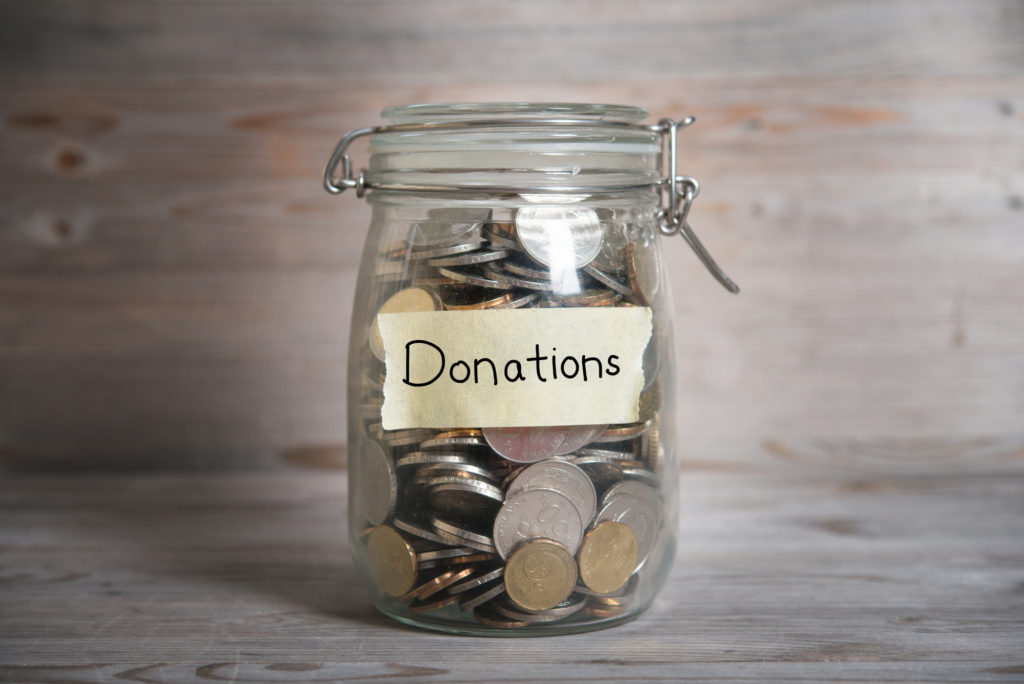Receipt Saver App: How to Save Smart Receipts in the Cloud
Offering charity donations or setting up a donation website for fundraising helps the needy and offers nonprofit organizations tax deductions on contributions.

Is your organization looking to begin donating or start accepting charitable donations? Then this article is a complete guide on everything you need to know about donation receipts.
What’s in this article?
- What are donation receipts?
- Why are donation receipts important to nonprofits?
- What is a donation receipt letter?
- What are the IRS charitable donation receipts requirements?
- Why do you need printable donation receipts?
- Can you get donation deduction without a receipt?
- How much can you donate without a receipt?
- How many donations can you claim without a receipt?
- Identifying fake donation receipts?
- Donation receipt template
- Examples of donation receipts
What are donation receipts?
A donation receipt is a letter of proof that is offered in return for the contribution made by the donor specifying the amount of the contribution to a charitable organization. It can be either in the form of a letter or an email sent to the donor to validate that they provided certain services for charitable purposes. This receipt showing charitable contributions is often offered to the donor at the end of the year.
Therefore, a donation invoice is primarily a written acknowledgement that a specific contribution through money, goods and services has been made. Charitable receipts carry several benefits for both donors and the organization. Most commonly, these receipts are used by donors while filling their taxes to claim return for the contribution or reduce the amount of taxes to be paid. Generally, any written acknowledgement carrying the name of the organization, the name of the donor, date, and the charitable amount is considered a donation invoice. However, only charitable donations offered to 501(c)(3) organizations are tax-deductible. Generally, contributions made to nonprofits like clubs, homeowners’ associations, or chambers of commerce are not tax-deductible.
Why are donation receipts important to nonprofits?
Charitable receipts are crucial because they help track the donations and, most importantly, cover bases with the IRS. However, these receipts become all the more important for nonprofits because they help reduce income tax owed by the organization and the employees that donate. Obviously, this return on contribution also encourages further donations. Charitable receipts are also required by the nonprofits for:
1. Legal requirements
The IRS demands donors to present their donation receipts in a few cases. Failure to produce the particular receipt can result in a penalty of $10 per contribution and cost as much as $5,000 for every specific campaign.
2. Recording donation history
A significant way of keeping track of an organization’s individual supporters’ donation histories is through collating donation receipts.
3. Accounting
Donation receipts are an essential element in providing organizations with an accurate and lucid financial record. It also notes the good or service provided to other charitable organizations.

What is a donation receipt letter?
A donation receipt letter is a written acknowledgement of the received donation that the charitable organization provides. Surprisingly, it is not necessarily a receipt form. Significantly, it can either be a card, a letter, or an email carrying specific crucial details that validates the donation.
Undoubtedly, it is also essential that a donation receipt letter carry all the necessary details before offering it to the donor. While the charitable organization may not face any penalty, a faulty or inadequately filled donation receipt letter can cause severe damage to “donor relations” by getting disallowed by the IRS.
What are the IRS charitable donation receipts requirements?
The IRS has set a few standards that a donation receipt must meet for a successful tax deduction:
1. Name of the donor and name of the organization
Every contribution’s invoice must include the name of the donor and the name of the organization. While it is not necessary to add the nonprofit’s address or Employee Identification Number (EIN), the receipt must carry a statement specifying the organization is a 501(c)(3)- tax-exempt organization.
2. Date of the donation
The IRS does not necessarily demand a date of donation, but it encourages the donor to record their contributions for future use and audit.
3. Donation amount
Every contribution’s invoice must include the amount of money donated by cheques, credit cards or payroll deduction.
If the donation amount exceeds $75, and the nonprofit offers goods or services in return, then the organization needs to provide a good-faith estimate of its value.
4. Description of non-monetary contributions
It’s not uncommon to make non-monetary contributions, be it in goods or services. However, the donation receipt must include a detailed description of each item donated. The IRS does not require donors to have the cash value of the goods or services donated because that may lead to a case of under or over-valuation.
5. Statement indicating if the donation was made in exchange for goods or services
Overall, there is a distinction between donors who receive goods and services provided in return for the donation and those who don’t, which the IRS specifies. It is a necessary distinction because only the amount exceeding the value of goods or services provided is tax-deductible.
Of course, if any goods or services were provided in exchange for a contribution to the donor, a receipt must include a description. Generally, the good-faith estimate of the value of those goods or services keeps track of the IRS audit.
6. Name and signature of the authorized representative
A donation receipt must specify the name of an authorized representative of the organization, like that of a board member or head of the department.
Why do you need printable donation receipts?
Claiming a tax deduction without a printable donation receipt or a physical receipt can get increasingly complicated in particular situations. Therefore, tax experts and the IRS recommend procuring a printable donation receipt for:
1. Claiming a tax deduction
While claiming a tax deduction without a donation receipt is possible in a few exceptional cases, it is difficult to claim a return or deduction for any contribution made in cash, cheque, or any other monetary form without a printable donation receipt.
2. Safeguarding donors from penalties
An organization that does not validate a contribution is not penalized by the IRS. Whereas, if a donor fails to produce a physical donation receipt letter, the IRS can penalize them and refuse tax deduction.
3. Record-keeping
Having printable donation receipts also aids in maintaining a personal filing system for future use and audits by the IRS.
4. Guidelines by the IRS
The IRS encourages donors to keep a record of any contributions made towards charitable organizations for future use. Generally, donations accepted in cash, cheque or through credit cards may not receive immediate donation receipts, which may cause inaccuracy in tax deduction. Therefore, donors must urge organizations to provide them with a formal acknowledgement via letter or mail, which can be saved and stored on a cloud-based system.
Can you get a donation deduction without a receipt?
Donors may claim for charitable donation deduction without a receipt contribution in some instances:
1. While claiming a contribution’s deduction for contributions to a charitable organization, only cash donations are considered without a receipt. Generally, property contributions are not included in this list.
2. Cash gifts of less than $250 are valid for donation deduction without a receipt.
3. To claim an endowment deduction without a receipt, a donor must provide a bank record or a payroll-deduction record to claim tax deduction successfully.
How much can you donate without a receipt?
The IRS considers each donation separately. Therefore, cash contributions of less than $250 may be made to charitable organizations without a contribution invoice letter. However, the donor must be able to display the donation through bank records or payroll deduction.
Generally, all non-cash donations of all amounts require an invoice letter from the charitable organization.
How many donations can you claim without a receipt?
Obviously, there is no such limit on the charitable contributions that a donor may make without an invoice. However, there needs to be proof of the generous contribution. Getting a receipt for contributions less than $250 may be impractical. Therefore, the IRS only demands that the donors keep a cancelled cheque or bank statement record or itemized goods or services to prove their contributions.
Identifying fake donation receipts
In this time and age of technology, it is easier to set up fake charitable websites and target human emotions to lure people into donating. Therefore, it is necessary to be able to identify fake contribution receipts to safeguard yourself from scams:
1. The IRS provides 501(c)(3)-tax-exempt status to recognized charities. Generally, if your invoice does not come bearing the 501(c)(3) statement, tax deduction becomes impossible on federal taxes, and this may be an alarm for a fake invoice.
2. Before contributing, it is advisable to cross-check the charity with your state consumer protection office or Better Business Bureau for its legitimacy.
3. Another effective method of finding a fake receipt is paying attention to the charity’s name and their web address. Undeniably, many scammers mimic the names of familiar and trusted avenues to extort money from donors.
Donation receipt template
Below is a simple contribution receipt template specifying monetary contribution for charitable organizations that are looking to get started and for donors looking for reference:
[Organization Name] [Organization logo] [Organization Address] [Contact] [Website]DONATION RECEIPT [Receipt ID]
Donated by: [Donor’s full name] [Donor’s Address]
Donation: [Donation amount or description of in-kind contribution]
Date received: [Date of the donation] [Disclaimer like “No goods or services were provided by the organization” or “Description and good faith estimate of the value of goods or services provided in return of the contribution”] [Organization Name] is a registered 501(c)(3) nonprofit organization, [EIN Number].
Examples of donation receipts
-
Facebook donation receipt
Facebook collects contributions on its website once a month and sent to Network for Good the next month. The NFG then disburses these donations to other nonprofits.
Donors can access their receipts from their payment history. To view payment history:
1. Go to Facebook and select the Settings menu
2. Go to Payments in the left column
3. Click a payment to view its receipts
Facebook donations, just like other nonprofit donations, are tax-deductible.
-
Furniture donation receipt
Unquestionably, the IRS allows donors to gift as much furniture as they like to charitable organizations, which can be written off if provided with the necessary documentation. Specifically, to be tax-deductible, the IRS requires the donated furniture to be in excellent and usable condition.
Generally, the IRS recognized charitable organization must provide a receipt carrying the item donated and the name and address of the organization.
-
Clothes donation receipt
If the donor itemizes their deductions, then the value of the clothing donated reduces their taxable income. However, donors must donate to registered 501(c)(3) organizations to get a tax deduction. The IRS also offers a free online tool to check whether a recipient is a qualified organization or not.
Donors can fill donations worth less than $500 in donation information on Schedule A of Form 1040. Otherwise, taxpayers with contributions of more than $500 can fill Form 8283.
-
Church donation receipt
Overall, a church receipt is proof of a charitable contribution made to a church. Generally, these contributions are usually used for operating expenses, mission work, or building or improvement costs. Altogether, a church usually offers a thank-you letter to the donors by the end of the tax year. Chiefly, this receipt carries the name of the church, donor’s name and address, date of the contribution and the amount.
Once the donations are thoroughly itemized in Schedule A, they become tax-deductible.
-
Salvation army donation receipt
The Salvation Army receipt reports itemized at cash value when calculating the tax-deductible value. Since it is a 501(c)(3) organization, it is tax-deductible for the donors and accepts almost anything of value.
Generally, a donor can download the receipt template to record a Salvation Army Donation from their website and enter the record.
-
Red cross donation receipt
A Red Cross receipt is provided to any donor for offering a contribution for their internal tax records. Contributions are welcomed through both PayPal and Credit Cards, which the donors can then note on Red Cross receipts available on their website.
Since the IRS recognizes it, contributions made to Red Cross are tax-deductible.
-
TTD donation receipt
Tirumala Tirupathi Devastanam (TTD) accepts online contributions through their websites. Under religious contributions, the trust also provides some benefits to donors including free accommodations for a few days and meals to religious devotees visiting the shrine.
-
United way donation receipt
United Way is a public charity recognized as a 501(c)(3) tax-exempt organization. Generally, it focuses on education, providing financial stability and healthcare to the needy.
Donors can access their copy of the receipt by downloading the receipt template from their website and filling out the necessary details.
-
Arms of hope donation receipt
Arms of Hope is a private and nonprofit corporation. It is tax-exempt under section 501(c)(3).
Donors can download the receipt available on the website and itemize their contributions for a tax deduction.
-
CRA donation receipt
CRA or Canada Revenue Agency offers an official receipt for income tax purposes. The receipt carries the name and address of the charity as registered with CRA, the amount of the gift and this description.
-
Deseret industries donation receipt
Desert industries accept donations all year round in both cash and non cash contribution. All the contributions made to DI are tax-deductible. A donation invoice is made available to the donors at the dock once they drop off their items.
-
MS walk donation receipt
Donors are welcomed to make donations towards people battling a disabling disease known as multiple sclerosis. Every donor’s contribution is tax-deductible to the fullest extent allowed by the IRS. Donors may reach at walk@mssociety.ca to get a copy of their donation receipt.
-
PTA donation receipt
A PTA is a national nonprofit that is dedicated to supporting and voicing the concerns of children and the youth in the schools and the community. If a PA/PTA is a 501(c)(3) organization, it provides an acknowledgement of the donation that is tax-deductible.
-
Vehicle donation receipt
A formal record documenting the charitable gifts of an automobile is known as a vehicle receipt. Significantly, donors seeking to deduct the value of a charitable vehicle from their income tax require a contribution receipt to prove the charity’s validity. Specifically, the organization usually provides a vehicle receipt, specifying the name/address of the charity, date, place of the contribution, and description of the vehicle.
-
ASPCA donation receipt
American Society for the Prevention of Cruelty to Animals or ASPCA uses donated money for animal welfare and provides direct care to animal shelters. Certainly, donations made to ASPCA are tax-deductible by the IRS. Generally, ASPCA offers a thank-you note post the gift for record-keeping. Otherwise, a donor must maintain a record through a cancelled cheque or a credit card statement for possible audits.
-
Kerala donation receipt
Anyone can contribute to Kerala’s fund. The amount is received by the current Chief Minister and utilized for disaster relief, COVID beneficiaries and other emergencies. An invoice for the same can be downloaded from their website and utilized for tax benefits.
-
Lions club glasses donation receipt
The organization accepts new, used, prescription, non-prescription eyeglasses as charity. However, Lions clubs are legally prohibited from advancing a tax receipt. They are also not in a position to suggest a fair market value price for the glasses donated.
-
NGO donation receipt
If your business contributes more than 250$ to any NGO, it has to receive an invoice for the same. Depending on state laws, this can be utilized for tax benefits. This can also be a great PR activity for your business by contributing to important causes.
-
World vision donation receipt
World vision improves the lives of children by giving them the power of a correct vision. All donations made to World Vision are eligible for a tax exemption.
Generally, donors can download their receipts from their payment history in their World Vision account online.
These receipts are a crucial component and the best practice to offer aid to charitable organizations that carry multitudinous benefits for both the donor and the nonprofit organization. Receipts confirming gifts or contributions provide donors with the confirmation of their donation while being tax-deductible.
Don’t forget to share









